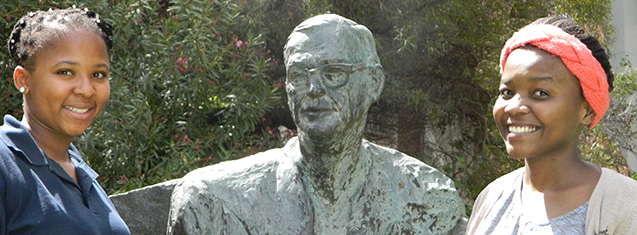Latest News Archive
Please select Category, Year, and then Month to display items
12 January 2024
|
Story Nonsindiswe Qwabe
|
Photo Sonia Small
 Since joining the UFS in 2008, Dr Grey Magaiza has worked extensively on approaches that can foster the socio-economic transformation of societies.
Since joining the UFS in 2008, Dr Grey Magaiza has worked extensively on approaches that can foster the socio-economic transformation of societies.
“The future should be one where communities can decide on their development agenda and futures. That’s the most important for me.” Dr Grey Magaiza, Deputy Director of the Centre for Gender and Africa Studies (CGAS) and Head of the Community Development programme on the Qwaqwa Campus, is passionate about capacitating communities to be agents of change and advancement. His vision for the future emphasises the empowerment of communities to take charge of their development by actively participating in decision making and the implementation of development projects that can improve their lives.
Since joining the UFS in 2008, Dr Magaiza has worked extensively on approaches that can foster the socio-economic transformation of societies. Over the years, he has crafted his research speciality into one that he is most proud of – being an interdisciplinary scientist immersed in the development of communities.
“I’m in a fortunate position of researching what I like. I say ‘fortunate’, because I’ve taken the time to understand what I’m passionate about, which is the overall field of rural livelihoods and livelihood futures – in short, community development. My research starts from an engaged university, understanding the elements that a university must use to enhance transformation and relevance to its immediate community in terms of development.”
One of the ways he has done this is by looking at social entrepreneurship as a development approach for young people in a rural setting. Through workshops with non-profit and civic organisations in Qwaqwa, Dr Magaiza has been helping these organisations to map out their needs and actively meet them through the involvement and support of external role players.
“We understand that communities are part of the national development agenda, but even that national agenda respects community knowledge and intentions and allows communities to shape their identity. A critical enabler of this is community organising. You bring back the capacity in communities to have dialogues on issues affecting them as spaces for engagement, knowledge exchange, and for people to just talk about their way forward.”
By enabling communities to define their development agenda, they can address their specific needs, challenges, and aspirations, he said. “When I look at livelihood futures, it’s quite an exciting aspect of my work – it’s like looking into a fortune tellers’ globe, because you’re not deciding for communities what they should do, but the communities themselves take those decisions.”
Kovsies among top SADC debaters
2014-11-26

From the left are: Matlhodi Leteane and Lehakoe Masedi.
The UFS Debate Society is definitely not all talk and no action. They ranked 10th at the Southern African Development Community (SADC) Debate Open held in Gaborone, Botswana, from 14 – 16 November 2014.
Kovsie students Lehakoe Masedi (second-year BCom Law) and Matlhodi Leteane (first-year LLB Law) teamed up to represent our university at the prestigious SADC event hosted by the University of Botswana Speaking Union. Eight Southern African countries were represented as well as six universities from South Africa.
“Attending a tournament focused on the debating of regional issues and solutions was a great reward and we wish to take part in more of these tournaments in future,” says Lehakoe.
Out of a pool of 40 of the best individual speakers in Southern Africa, Lehakoe and Matlhodi were jointly awarded 18th place.
“Debate continues to help the growth of the student community and the attendance of such debate tournaments lends a lot of help to the internal growth of not only our partnership but our debate society as a whole,” says Lehakoe. “We take great pride in our performance, especially as first-year *British Parliamentary speakers. We wish to improve and grow as we progress further in our debate careers.”
*British Parliametary speaking is the style of debating used by university institutions.